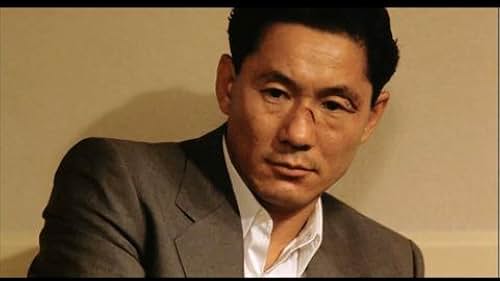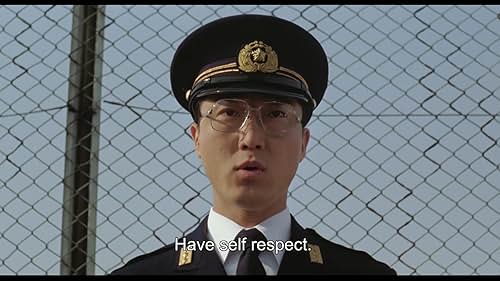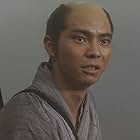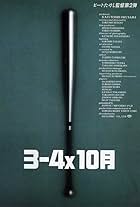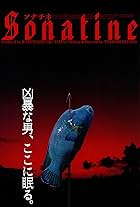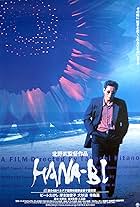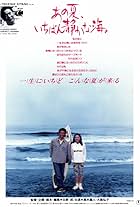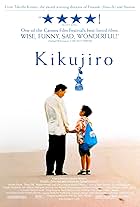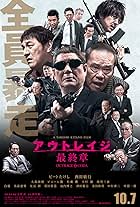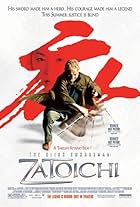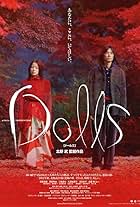IMDb RATING
7.1/10
13K
YOUR RATING
A violence prone police officer discovers that his colleague is trafficking drugs.A violence prone police officer discovers that his colleague is trafficking drugs.A violence prone police officer discovers that his colleague is trafficking drugs.
- Awards
- 3 wins & 1 nomination
Takeshi Kitano
- Azuma
- (as Beat Takeshi)
Sei Hiraizumi
- Iwaki
- (as Shigeru Hiraizumi)
- Director
- Writers
- All cast & crew
- Production, box office & more at IMDbPro
Storyline
Did you know
- TriviaTakeshi Kitano insisted on long takes. Close-ups easily lasted 10 seconds, medium shots went on for 20 seconds and the shot where Azuma (Kitano) walks onto the bridge and into the frame lasted 57 seconds.
- GoofsBoom mic visible from behind a car at 49:28 as Iwaki approaches Azuma.
- Quotes
Azuma: Turn yourself in tomorrow.
Delinquent Kid: I didn't do anything!
Azuma: You didn't do anything?
[Rams kid's head into the wall.]
Azuma: Well, then I didn't do anything either!
- Crazy creditsThere are no opening credits beyond the title.
- Alternate versionsWhen the film was released in Swedish cinemas in 1992, it was censored with a little more than one minute for violence, the cuts were made in the following scenes:
- The policeman getting assaulted before he gets his head crushed by a baseball bat.
- The scene where Azuma assaults Hazishume on the toilet, and the finger cutting sequence.
- The following cuts are when Azuma assaults the killer in the locker room and a bloody execution scene at the end.
- ConnectionsFeatured in Seven Psychopaths (2012)
- SoundtracksGnossienne No.1
(1890)
Main theme is an electronic variation of the above title by Erik Satie
Arranged by Daisaku Kume
Performed by Daisaku Kume
Produced by Kazuyoshi Okuyama
Courtesy by Vap Inc.
Featured review
The first 10 mins of the film already tell you what Takeshi Kitano is up to - we see a homeless man eating peacefully and enjoying the foods beside his make-shift home in a park. Suddenly his bowl is hit by a football, and then a gang of teenagers rough him up, giggling while beating up the man mercilessly until he loses conscious. Then all the kids return to their safe middle-class homes.
Kitano, the "violent cop", sees the whole thing, but he doesn't stop the kids right away. Instead, he follows one to his home, shows the kid's mother his police ID, walks up to the kid's room and starts kicking and snapping him, demanding the boy to give himself up to the police tomorrow. To me, the movie more or less ends there. The plot then moves on to the usual good-cop corrupted-cop routine, involving a sub-plot on Kitano's retarded sister. To sum up, the storyline is actually very predictable and fails to create any suspended and dramatic tension.
This is where "Violent Cop" departs from other movies of the same genre - Kitano's violence is raw and real, and he wants to show you in yer face. Unlike the highly stylized and cartoonish violence of John Woo (anything who knows a bit about guns can tell you that you cannot fire a few rounds of bullets from two guns with both hands at the same time when you're jumping off a car), for example, Kitano shows the essence of violence and how it actually affects people, both physically and psychologically.Violence, in the world of Kitano, can come suddenly, aimlessly and randomly, and no one is safe!
"Violent Cop" is an excellent movie on all counts, and Kitano (in both directing and acting) can only go above it in, IMHO, Hana-Bi.It's kind of sad (as a big fan of Kitano) to see him going back to making new movies like "Brothers", a replica in spirit (if not in actual storylines) of his early stunning successes like this one and Hana-Bi. He's actually very good in "Gohatto", and fans like me want him to know that he should try more new things.
Kitano, the "violent cop", sees the whole thing, but he doesn't stop the kids right away. Instead, he follows one to his home, shows the kid's mother his police ID, walks up to the kid's room and starts kicking and snapping him, demanding the boy to give himself up to the police tomorrow. To me, the movie more or less ends there. The plot then moves on to the usual good-cop corrupted-cop routine, involving a sub-plot on Kitano's retarded sister. To sum up, the storyline is actually very predictable and fails to create any suspended and dramatic tension.
This is where "Violent Cop" departs from other movies of the same genre - Kitano's violence is raw and real, and he wants to show you in yer face. Unlike the highly stylized and cartoonish violence of John Woo (anything who knows a bit about guns can tell you that you cannot fire a few rounds of bullets from two guns with both hands at the same time when you're jumping off a car), for example, Kitano shows the essence of violence and how it actually affects people, both physically and psychologically.Violence, in the world of Kitano, can come suddenly, aimlessly and randomly, and no one is safe!
"Violent Cop" is an excellent movie on all counts, and Kitano (in both directing and acting) can only go above it in, IMHO, Hana-Bi.It's kind of sad (as a big fan of Kitano) to see him going back to making new movies like "Brothers", a replica in spirit (if not in actual storylines) of his early stunning successes like this one and Hana-Bi. He's actually very good in "Gohatto", and fans like me want him to know that he should try more new things.
- How long is Violent Cop?Powered by Alexa
Details
Box office
- Gross US & Canada
- $1,960
- Runtime1 hour 43 minutes
- Color
- Aspect ratio
- 1.85 : 1
Contribute to this page
Suggest an edit or add missing content


